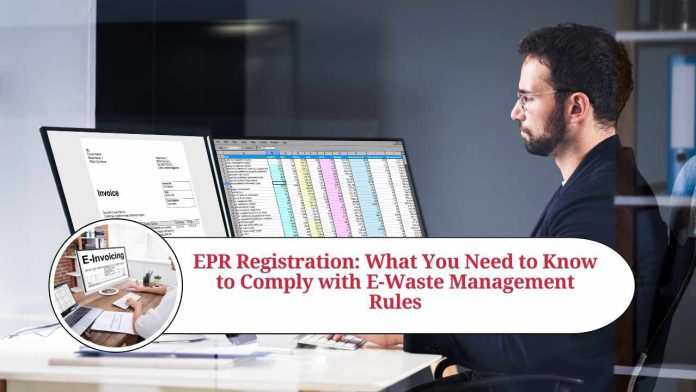In recent times, the Indian government has taken significant steps towards ensuring environmental protection and management in the country. One of the measures taken in this direction is the introduction of the EPR (Extended Producer Responsibility) concept. This concept aims to make producers responsible for the environmental impact of their products throughout their lifecycle. In this blog, we will discuss what EPR registration is, its significance, and the steps involved in registering for EPR.
What is EPR Registration?
EPR registration is a mandatory registration required for producers, brand owners, and importers of specified products listed in the E-waste Management Rules, 2016. The registration is necessary to comply with the EPR provisions specified in the rules. EPR provisions state that producers or brand owners of specified products are responsible for the environmental impact of their products throughout their lifecycle.
The E-waste Management Rules, 2016, apply to all electrical and electronic equipment listed in Schedule-I of the rules. The products listed in Schedule-I are divided into two categories, namely, ‘Consumer Electrical and Electronic Equipment’ and ‘Information Technology Equipment.’ Producers or brand owners of products listed in these categories need to register for EPR.
Why is EPR Registration Significant?
EPR registration is significant for various reasons. Firstly, it is mandatory for producers, brand owners, and importers of specified products listed in the E-waste Management Rules, 2016, to register for EPR. Failure to register can attract penalties and legal action.
Secondly, EPR registration helps ensure the proper disposal and management of e-waste. Producers or brand owners of specified products need to ensure that their products are collected, dismantled, and recycled in an environmentally sound manner. EPR registration helps track the quantity of e-waste generated by producers or brand owners, and it ensures that the e-waste is disposed of in an environmentally friendly manner.
Lastly, EPR registration helps promote sustainable production and consumption practices. Producers or brand owners of specified products need to design their products with eco-friendly materials and make them easily recyclable. This promotes sustainable production practices and encourages consumers to adopt eco-friendly consumption practices.
Steps to Register for EPR
The process to register for EPR is straightforward and can be completed online. The following are the steps involved in registering for EPR:
Step 1: Visit the website of the State Pollution Control Board (SPCB) or Pollution Control Committee (PCC) of the Union Territory in which the producer or brand owner is located.
Step 2: Navigate to the EPR registration section and select the category of products for which registration is required.
Step 3: Fill in the registration form with the required details, such as name and address of the producer or brand owner, type of products, and contact information.
Step 4: Upload the necessary documents, such as PAN card, GST registration certificate, and proof of ownership.
Step 5: Pay the registration fee, which varies from state to state.
Step 6: Submit the registration form and wait for approval from the SPCB or PCC.
Conclusion
EPR registration is a crucial step towards ensuring environmental protection and management in the country. Producers or brand owners of specified products need to register for EPR to comply with the EPR provisions specified in the E-waste Management Rules, 2016. EPR registration helps promote sustainable production and consumption practices, ensure proper e-waste management, and avoid penalties and legal action. The process to register for EPR is straightforward and can be completed online.
Read more useful content:
Frequently Asked Questions (FAQs)
Q: What is EPR registration?
A: EPR registration is a mandatory registration required for producers, brand owners, and importers of specified products listed in the E-waste Management Rules, 2016, to comply with the Extended Producer Responsibility provisions specified in the rules.
Q: Which products require EPR registration?
A: The E-waste Management Rules, 2016 apply to all electrical and electronic equipment listed in Schedule-I of the rules. The products listed in Schedule-I are divided into two categories, namely, ‘Consumer Electrical and Electronic Equipment’ and ‘Information Technology Equipment.’ Producers or brand owners of products listed in these categories need to register for EPR.
Q: Why is EPR registration important?
A: EPR registration is important for various reasons. Firstly, it is mandatory for producers, brand owners, and importers of specified products listed in the E-waste Management Rules, 2016, to register for EPR. Failure to register can attract penalties and legal action. Secondly, EPR registration helps ensure the proper disposal and management of e-waste. Producers or brand owners of specified products need to ensure that their products are collected, dismantled, and recycled in an environmentally sound manner. Lastly, EPR registration helps promote sustainable production and consumption practices.
Q: What is the process to register for EPR?
A: The process to register for EPR is straightforward and can be completed online. Producers or brand owners need to visit the website of the State Pollution Control Board (SPCB) or Pollution Control Committee (PCC) of the Union Territory in which they are located, navigate to the EPR registration section, fill in the registration form with the required details, upload the necessary documents, pay the registration fee, and submit the registration form. The SPCB or PCC will then review the application and grant approval if all the requirements are met.
Q: What documents are required for EPR registration?
A: The documents required for EPR registration vary from state to state. Generally, producers or brand owners need to submit documents such as PAN card, GST registration certificate, proof of ownership, and authorization letter.
Q: What is the validity period of EPR registration?
A: The validity period of EPR registration varies from state to state. Generally, EPR registration is valid for a period of one to five years, after which producers or brand owners need to renew their registration.
Q: What is the registration fee for EPR registration?
A: The registration fee for EPR registration varies from state to state. Generally, the registration fee is based on the type and quantity of products being registered.




















